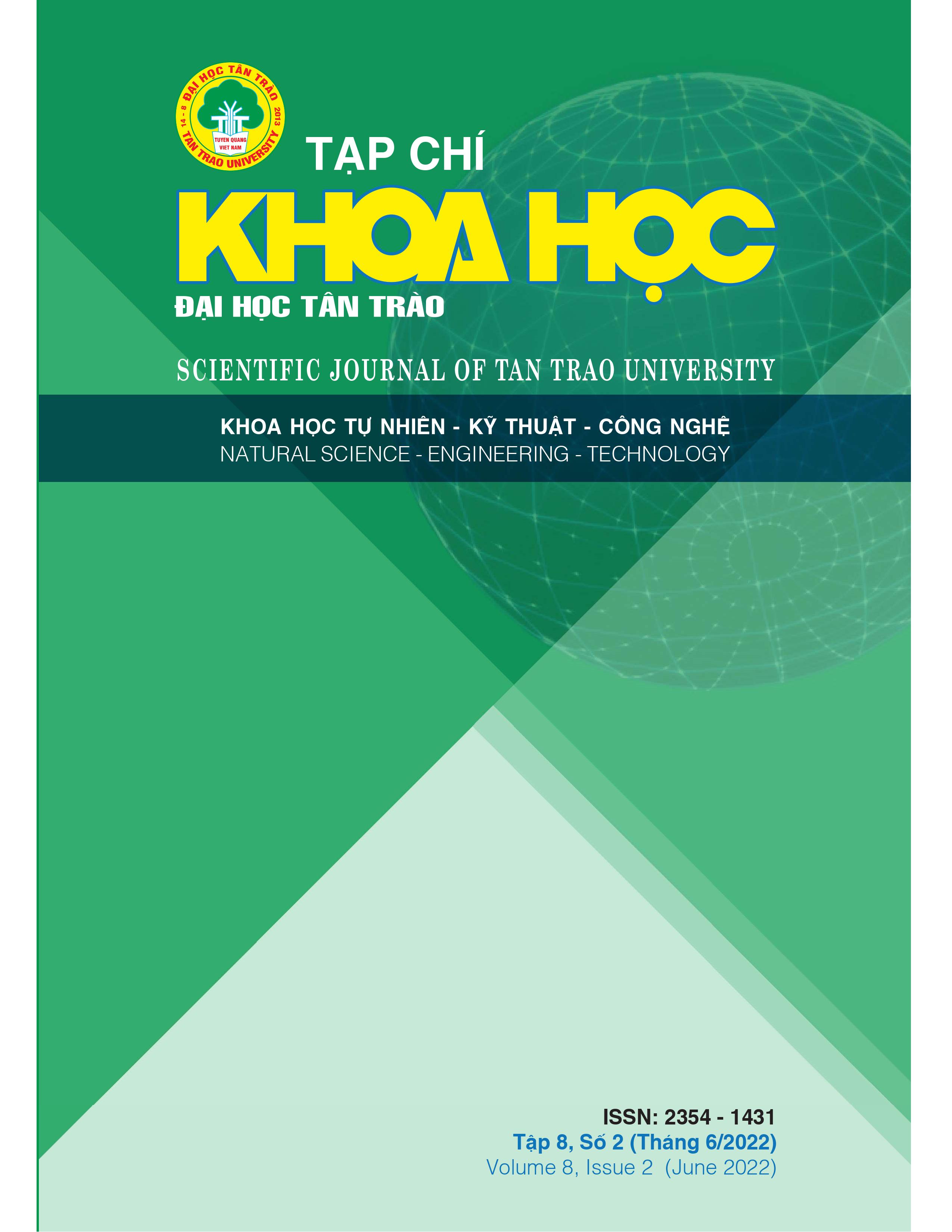EFFECT OF PROCESSING CONDITION ON EXTRACTION PROCESS OF MANGO SEED KERNEL OIL
DOI:
https://doi.org/10.51453/2354-1431/2022/749Keywords:
Mango seed kernel oil, extraction yieldAbstract
The mango is an important tropical fruit of worldwide acceptance, extensive marketing, vast production, wide distribution, and benefits from human health. Mango wastes such as the seed have functional and nutritional potential. The study was conducted on 5 varieties of mango that are commonly grown and consumed in Vietnam. The results showed that the Taiwan mango variety has outstanding characteristic suitable for oil extraction as follows: kernel weight/whole seed 40,7%, average seed length 17,3% and oil content in seeds accounted for 11,3%. The main processing parameters were also examined in order to select the best values which enhance the extraction yield and the quality of the extracted oil. The ground mango seed kernels were extracting three times by ethanol 96% at a ratio of 1 g ground mango seed kernel of 24 ml solvents for 8 hours at 50℃. The extract was then evaporated by rotary vacuum equipment to collect mango seed kernel oil. The oil obtained has high levels of unsaturated fatty acids and vitamin E, and can be used as raw material in the production of functional foods and pharmaceuticals.
Downloads
References
[1] Abdalla. A. E., Darwish. S. M., Ayad. E. H., & El-Hamahmy. R. M. (2007), Egyptian mango by-product 1. Compositional quality of mango seed kernel. Food chemistry, 103(4), 1134-1140.
[2] Akanda. M., Haque. J., Sarker. M., Islam. Z., Norulaini. N., Ferdosh. S., Rahman. M. M., & Omar. A. (2015), Optimization of supercritical carbon dioxide extraction parameters of cocoa butter analogy fat from mango seed kernel oil using response surface methodology. Journal of Food Science and Technology, 52(1), 319-326.
[3] Fahimdanesh. M., & Bahrami. M. E. (2013), Evaluation of physicochemical properties of Iranian mango seed kernel oil. International Conference on Nutrition and Food Sciences,
[4] Kaphueakngam. P., Flood. A., & Sonwai. S. (2009), Production of cocoa butter equivalent from mango seed almond fat and palm oil mid-fraction. Asian Journal of Food and Agro-Industry, 2(4), 441-447.
[5] Khan. I. T., Nadeem. M., Imran. M., Ajmal. M., & Ali. S. (2018), Antioxidant activity, fatty acids characterization and oxidative stability of Gouda cheese fortified with mango (Mangifera indica L.) kernel fat. Journal of Food Science and Technology, 55(3), 992-1002.
[6] Kittiphoom. S. (2012), Utilization of mango seed.
[7] Kittiphoom. S., & Sutasinee. S. (2013), Mango seed kernel oil and its physicochemical properties. International Food Research Journal, 20(3), 1145.
[8] Kittiphoom. S., & Sutasinee. S. (2015), Effect of microwaves pretreatments on extraction yield and quality of mango seed kernel oil. International Food Research Journal, 22(3).
[9] Lê Văn Việt Mẫn, Lại Quốc Đạt, Nguyễn Thị Hiền, Tôn Nữ Minh Nguyệt, Trần Thị Thu Trà (2011). Công nghệ chế biến thực phẩm. Nhà xuất bản Đại học quốc gia TPHCM.
[10] Maisuthisakul. P., & Gordon. M. H. (2009), Antioxidant and tyrosinase inhibitory activity of mango seed kernel by product. Food chemistry, 117(2), 332-341.
[11] Nadeem. M., Imran. M., & Khalique. A. (2016), Promising features of mango (Mangifera indica L.) kernel oil: a review. Journal of Food Science and Technology, 53(5), 2185-2195.
[12] Nzikou. J., Kimbonguila. A., Matos. L., Loumouamou. B., Pambou-Tobi. N., Ndangui. C., Abena. A., Silou. T., Scher. J., & Desobry. S. (2010), Extraction and characteristics of seed kernel oil from mango (Mangifera indica). Research Journal of Environmental and Earth Sciences, 2(1), 31-35.
[13] Puravankara. D., Boghra. V., & Sharma. R. S. (2000), Effect of antioxidant principles isolated from mango (Mangifera indica L) seed kernels on oxidative stability of buffalo ghee (butter‐fat). Journal of the Science of Food and Agriculture, 80(4), 522-526.
[14] Solís-Fuentes. J. A., & del Carmen Durán-de-Bazúa. M. (2011), Mango (Mangifera indica L.) seed and its fats. In Nuts and Seeds in health and disease prevention (pp. 741-748). Elsevier.
[15] Sonwai. S., Kaphueakngam. P., & Flood. A. (2014), Blending of mango kernel fat and palm oil mid-fraction to obtain cocoa butter equivalent. Journal of Food Science and Technology, 51(10), 2357-2369.
[16] Torres-León. C., Rojas. R., Contreras-Esquivel. J. C., Serna-Cock. L., Belmares-Cerda. R. E., & Aguilar. C. N. (2016), Mango seed: Functional and nutritional properties. Trends in Food Science & Technology, 55, 109-117.
[17] Vijay. P., Malik. S., & Srivastava. G. (2007), Intervarietal differences in the surface morphology and anatomy of mango (Mangifera Indica L.) fruit. Phytomorphology, 57, 1-10.
[18] Yadav. K., Garg. N., Verma. A., Kumar. S., & Trivedi. M. (2017), Optimization and extraction of oil from mango seed kernel (Mangifera indica). Indian Journal of Agricultural Sciences, 87(7), 943-946.
Downloads
Published
How to Cite
Issue
Section
License

This work is licensed under a Creative Commons Attribution-ShareAlike 4.0 International License.
All articles published in SJTTU are licensed under a Creative Commons Attribution-ShareAlike 4.0 International (CC BY-SA) license. This means anyone is free to copy, transform, or redistribute articles for any lawful purpose in any medium, provided they give appropriate attribution to the original author(s) and SJTTU, link to the license, indicate if changes were made, and redistribute any derivative work under the same license.
Copyright on articles is retained by the respective author(s), without restrictions. A non-exclusive license is granted to SJTTU to publish the article and identify itself as its original publisher, along with the commercial right to include the article in a hardcopy issue for sale to libraries and individuals.
Although the conditions of the CC BY-SA license don't apply to authors (as the copyright holder of your article, you have no restrictions on your rights), by submitting to SJTTU, authors recognize the rights of readers, and must grant any third party the right to use their article to the extent provided by the license.


